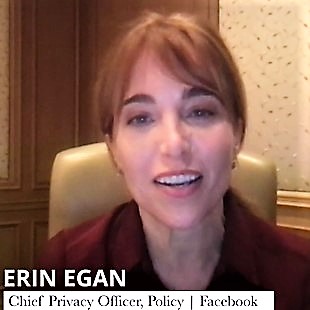Facebook Wants ‘Comprehensive Privacy Law’ for Collecting and Sharing Personal Data
Firm’s top privacy official cautions not to restrict tracking
The smarter way to stay on top of the multichannel video marketplace. Sign up below.
You are now subscribed
Your newsletter sign-up was successful
Facebook wants to see policies adopted that create a “core set of rights” for consumer privacy without creating rules that can be “used to restrict” how personal data is collected and shared, Erin Egan, the company’s chief privacy officer-policy, said Friday (Feb. 19) during a presentation to the Media Institute in Washington.
“Our priority is a comprehensive federal privacy law,” Egan said during the group’s monthly virtual webinar. She said that artificial intelligence will likely play a significant role in establishing privacy policy. And she took a swipe at Apple’s recent comments about use of “tracked” data, voicing concern that such perceptions “will discourage advertising.”
Also Read: Apple Privacy Labels Draw Hill Flak

“Personalized advertising has real value,” Egan said, adding that she hopes “readers will make that connection.” She added that, “Many policy makers don’t understand the unintended consequences of a ban on targeted advertising.” She said that Facebook is accelerating its educational efforts to help lawmakers understand that perspective.
Egan’s presentation was a pep talk for media companies and advertisers to convince policy makers about the value of targeted advertising – “how personalized advertising helps businesses and people.”
She cited several research studies, including an MIT economic analysis that showed social media services are worth $48 per month to users.
Her focus on the perceived value of personalized advertising emphasized that the young category is in “constant evolution” and that the industry should encourage an “open ad-supported internet” which “protects people’s privacy at the same time.” Describing herself as a lawyer with more than 20 years of advertising law experience, Egan acknowledged that “increased regulation can help,” adding that “we have to increase trust in the systems that support the internet.”
The smarter way to stay on top of the multichannel video marketplace. Sign up below.
She cited ongoing comments by Facebook CEO Mark Zuckerberg calling for “comprehensive federal privacy legislation” which, she said “will go a long way to encourage trust in the internet.”
Also Read: Big Tech CEOs to Testify on Disinformation
In response to a Multichannel News question about Zuckerberg’s planned remarks on this topic when he (along with top Google and Twitter executives) appears before a House Commerce Committee hearing on March 25, Egan said that it’s “too early” to predict what he will say.
Avoiding Legal Fragmentation
She declined to plunge into a question about state-level proposals for data protection, such as legislative plans that have emerged recently in Maryland, Virginia, Florida, Minnesota and other states. Egan noted that privacy laws in the U.S. have “not kept up with the rest of the world,” citing Europe’s General Data Protection Regulation, which also requires data localization (storing data within the country of origin).
Given the global e-commerce economy, she explained, these state-by-state and other developments “raise the risk of fragmentation, “which could create a splintered siloed internet” that would restrict the value of online services.
Egan said that federal data privacy regulations should assure “accountability and reliability” along with considerations for risk assessment. She said that Facebook has invested in technical systems to monitor how the data it collects “flows,” in response to the 2019 Federal Trade Commission $5 billion settlement over privacy violations.
Egan said that her company is looking forward to learning details about a proposed new federal agency to deal with digital platform issues, including digital protections. But she said that any such new regulatory group should draw from the expertise and experiences of existing agencies, such as the FTC.
She also pointed out that new technologies raise a vast set of issues affecting privacy. In particular she pointed to artificial intelligence, a growing factor in the privacy dialogue.
“AI poses really complex questions and challenges,” she said. It will “not be easy” to develop “responsible AI legislation.”
“We don’t want to cut short the ability of AI’s potential with inflexible rules that may not be able to adapt,” Egan added. “We’ll have to spend a lot of time to get it right.”
Contributor Gary Arlen is known for his insights into the convergence of media, telecom, content and technology. Gary was founder/editor/publisher of Interactivity Report, TeleServices Report and other influential newsletters; he was the longtime “curmudgeon” columnist for Multichannel News as well as a regular contributor to AdMap, Washington Technology and Telecommunications Reports. He writes regularly about trends and media/marketing for the Consumer Technology Association's i3 magazine plus several blogs. Gary has taught media-focused courses on the adjunct faculties at George Mason University and American University and has guest-lectured at MIT, Harvard, UCLA, University of Southern California and Northwestern University and at countless media, marketing and technology industry events. As President of Arlen Communications LLC, he has provided analyses about the development of applications and services for entertainment, marketing and e-commerce.

